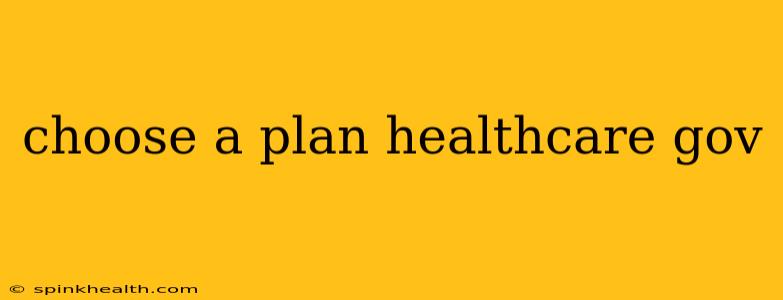Navigating the Healthcare.gov website to choose a health insurance plan can feel overwhelming. This guide will break down the process, answering common questions and providing tips to help you select the best plan for your individual needs and budget.
Understanding the Basics:
Before diving into plan selection, it's crucial to understand the key components of a health insurance plan:
- Premiums: The monthly payment you make to maintain your health insurance coverage.
- Deductible: The amount you pay out-of-pocket for healthcare services before your insurance company starts covering costs.
- Copay: A fixed amount you pay for a doctor's visit or other healthcare services.
- Coinsurance: Your share of the costs of a covered healthcare service, calculated as a percentage (e.g., 20%).
- Out-of-Pocket Maximum: The most you'll pay out-of-pocket during a policy year. Once you reach this limit, your insurance covers 100% of covered services.
- Network: The group of doctors, hospitals, and other healthcare providers your plan covers. Seeing providers outside your network usually results in higher costs.
- Formulary: A list of prescription drugs covered by your plan. Some plans may require prior authorization for certain medications.
How to Choose a Plan on Healthcare.gov
The Healthcare.gov website guides you through a series of questions to determine your eligibility for financial assistance and to narrow down your plan options. Here's a step-by-step breakdown:
-
Create an Account: You'll need to create an account to access the marketplace and apply for coverage.
-
Provide Information: Be prepared to provide personal and financial information, including income, household size, and location. This information is used to determine your eligibility for subsidies and to narrow down your plan options.
-
Compare Plans: Healthcare.gov presents you with a list of plans available in your area. Use the comparison tool to sort and filter plans based on your priorities (premium cost, deductible, network, etc.). Pay close attention to the details of each plan.
-
Review Plan Details: Click on each plan to see the full details, including the formulary, provider network, and specific coverage details.
-
Consider Your Needs: Think about your healthcare needs. Do you have chronic conditions? Do you frequently visit the doctor? Do you take prescription medications regularly? These factors will influence your plan choice.
-
Enroll in a Plan: Once you've chosen a plan, you can enroll online through Healthcare.gov.
Frequently Asked Questions (Based on "People Also Ask" Search Results)
What is the best health insurance plan on Healthcare.gov?
There's no single "best" plan. The ideal plan depends entirely on your individual needs, budget, and health status. Consider your priorities (low premiums, low deductible, broad network) and weigh them against each other. The comparison tool on Healthcare.gov is your best resource for finding a plan that fits your circumstances.
How do I know which doctors are in my plan's network?
Each plan's details on Healthcare.gov will usually include a link to a provider directory. This directory allows you to search for doctors and hospitals within your plan's network.
How much will my health insurance cost?
Your cost will depend on several factors, including your income, the plan you choose, your location, and your family size. Healthcare.gov provides cost estimates based on your inputted information. Remember that subsidies can significantly reduce the overall cost.
What if I miss the open enrollment period?
Missing the open enrollment period usually means you can only enroll in a plan if you qualify for a Special Enrollment Period due to a qualifying life event (e.g., marriage, birth of a child, job loss). Keep an eye on deadlines!
Can I change my healthcare plan during the year?
You can usually only change your plan during the open enrollment period unless you qualify for a Special Enrollment Period.
Conclusion: Making Informed Decisions
Choosing a healthcare plan is a significant decision. By understanding the key components of a plan, utilizing the Healthcare.gov comparison tool effectively, and carefully considering your individual needs, you can find a plan that provides the coverage and affordability you need. Remember to thoroughly review all plan details before enrolling.

